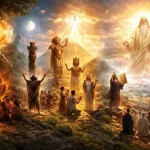Faith in Flux: The New Meaning of Spiritual Discipline in Modern Life
In today’s fast-paced world, the idea of spirituality is undergoing a quiet revolution. The modern seeker no longer views faith as a set of strict rituals or inherited customs, but as a living, evolving practice that adapts to the rhythms of daily life. The phrase “Faith in Flux” perfectly captures this transformation — a shift from rigid religiosity to a more conscious, compassionate, and flexible form of spiritual discipline. This new faith is not bound by temples or texts alone; it thrives in mindfulness, self-reflection, and a deep sense of purpose.
The Changing Landscape of Faith
In earlier generations, spiritual discipline meant waking up at dawn for prayer, fasting on sacred days, and following prescribed moral codes set by tradition. Religion provided structure and identity, giving life a collective rhythm. But as societies modernized, people began questioning inherited beliefs. Technology, science, and global communication opened access to diverse philosophies and faith systems. As a result, spiritual seekers today are less concerned with dogma and more with experience — less about believing, and more about being.
This evolution doesn’t mean that people have lost faith; it means faith has become more personal. The modern individual finds spirituality in everyday moments — in the calm of meditation, in gratitude journaling, or even in mindful cooking. For many, spirituality is now a journey inward, not upward — a dialogue with the self, not a monologue with the divine.
From Discipline to Awareness
Traditional discipline often meant strict adherence: specific prayers at specific times, or abstaining from worldly pleasures. Modern spiritual discipline, however, has shifted towards awareness and intentionality. Instead of forcing the body and mind into rules, it seeks harmony between them. Waking up early for yoga or meditation, practicing digital detox, or maintaining emotional balance in relationships — all these are forms of discipline redefined by the modern age.
This shift reflects a deeper understanding of human psychology. People today recognize that true discipline is not suppression, but transformation. It is not about rejecting the world, but engaging with it consciously. The focus has moved from ritual purity to mental clarity, from sacrifice to self-mastery.
Technology and the New Spiritual Space
Ironically, the same technology that once distracted humanity from spiritual life is now being used to enhance it. Meditation apps, virtual retreats, online satsangs, and guided journaling platforms have made spirituality more accessible than ever before. The smartphone, once seen as a tool of distraction, has become a bridge to self-awareness for millions.
However, this digital spiritualism also brings challenges. When spiritual practice turns into performance — through posts, likes, and hashtags — it risks becoming superficial. The essence of modern spiritual discipline lies in balance: using technology as a tool, not a trap. The goal remains authenticity — to connect deeply with oneself, even in a hyper-connected world.
The Mind as a Sacred Space
The idea of discipline has shifted from external control to internal order. The mind, once viewed as the battlefield of distraction, is now seen as a sacred temple. Mindfulness and meditation are no longer limited to monks or mystics; they have become essential life skills. This democratization of spiritual practice is one of the most beautiful features of faith in flux.
Corporate leaders, artists, teachers, and homemakers alike now embrace silence and introspection as part of their daily routine. The ancient practice of “inner observation” has reemerged as the modern art of emotional intelligence. By mastering thoughts, emotions, and impulses, people cultivate a new form of spiritual discipline — one that aligns with modern realities yet honors timeless wisdom.
Community, Compassion, and Connection
In the modern interpretation of faith, discipline is not just about personal growth; it’s about how one interacts with the world. Compassion, empathy, and service have become central to the spiritual path. Volunteering, sustainable living, and social awareness are seen as sacred acts. In this way, the walls between the religious and the social are dissolving.
Faith in flux means recognizing divinity not only in prayer halls but also in the streets, offices, and homes where human life unfolds. The disciplined life of today’s seeker involves staying kind amid chaos, calm amid conflict, and grateful amid uncertainty.
The Future of Spiritual Discipline
The future of faith will not depend on conformity but consciousness. As humanity faces environmental crises, mental health challenges, and social division, spiritual discipline will serve as an anchor — a way to stay centered, compassionate, and purposeful. The next era of spirituality will be defined not by rituals but by values, not by dogmas but by awareness.
Faith in flux is not a loss of tradition; it is its renewal. It allows each generation to reinterpret ancient wisdom in the light of present needs. The soul of discipline remains the same — self-awareness, love, and devotion — but its form evolves with time.
In the end, spiritual discipline in modern life is not about escaping the world, but about engaging with it consciously. It is about walking through life awake — with a quiet mind, a compassionate heart, and an unshakable faith that evolves, just as life itself does.
~Religion World Bureau










